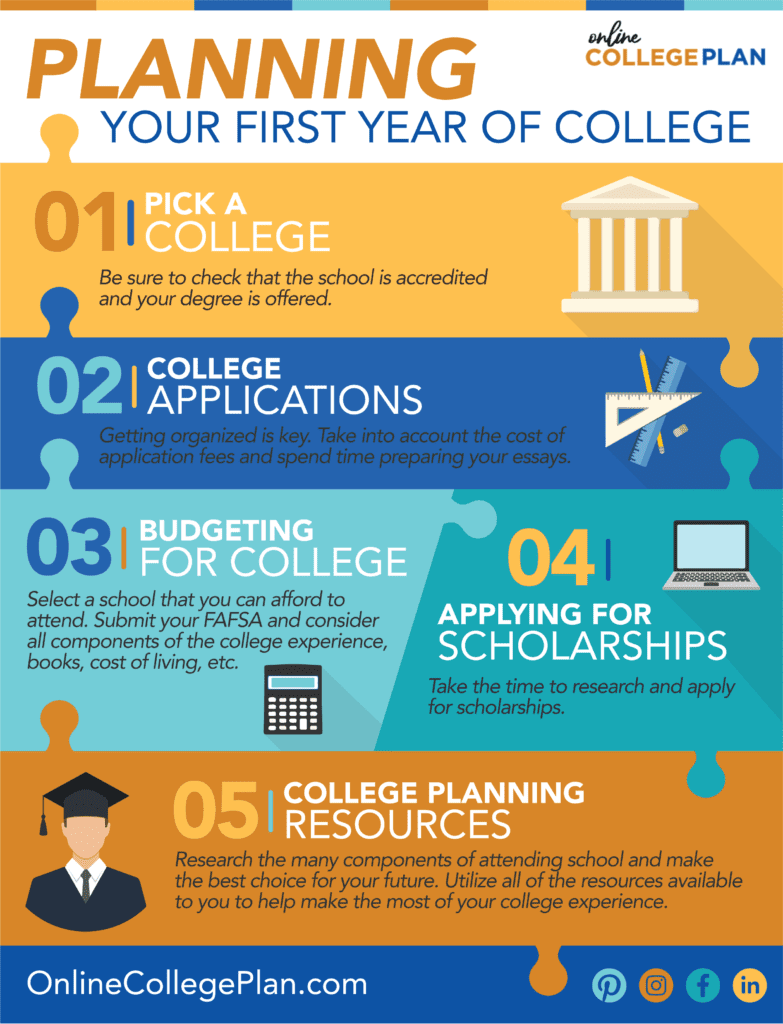Planning for your First Year in College
Find your degree
By Jennifer W. Eisenberg

Being a college freshman is a unique time in life. You are taking some of your first steps into adulthood and embarking on a concrete plan to shape the path your life takes. Your first year of college also presents a number of potential pitfalls (the freshman 15! that first semester report card!! Being fully in charge of your schedule for the first time!) that, with a smidge of planning, can be avoided and you can stay on the academic up and up.
See Also: The 100 Best Online Colleges
Whether you have decided on a major or not, you can make your first year at college something you will write entries about on your recipe blog for the rest of your life. The first step is to access the college catalog and see what is entailed with your chosen major or what piques your undecided interest. Then you declare a major and meet with your advisor to get approval for the classes you will take and make sure they match up with the classes you need in order to graduate. Next, you should really consider your personal circadian rhythm (Eight am class? Really??) and your academic skill sets as you set the weekly schedule at which these classes will occur. Finally, you should familiarize yourself with the student resource centers on campus (academic and otherwise) for accommodations for special needs, testing for possible academic trouble areas/outright learning disabilities, and so you know where the tutoring occurs, should you run into the need for it, among other things.

College Catalog
This should be available on the college website, and it will list every major offered by the school and all the degree requirements wherewith. It is also available as a book from the admissions office, lol. if you already know what you’re going to do, then you are ahead of the game and can skip to #3. if you don’t know what you want to do, settle in, you have some options. Spend some time perusing this tome and know that most colleges offer a general course of study that can be specialized at a later date. You just start out front loaded with more of the general class work that would otherwise be folded into your junior and senior year, and as you get closer to your decision, you can pick up more specialized coursework and hopefully complete your degree in about the same time as a student with more firm ideas of what they want to do.
A field trip that can be connected to this step is to visit the college career center for aptitude and interest testing. This can even be accomplished on your summer visit for orientation. This testing is usually done on a computer and can really open your eyes to possibilities that you may not have previously considered.

Pick a Major
If you now have an idea of what you would like to do, the college catalog will outline what your first year should contain course-wise and what you can expect from the ensuing years. Your major does not need to be your life’s passion. Not everyone has the sheer talent, the force of will, and the personality necessary to make a career in the arts. But there are (for example) orchestras in the world that are entirely peopled by doctors, who participate because it is a thing that they also love. In the last step, you went to the college’s career center for aptitude testing. Now consider looking at your college in various rankings online and give your college an aptitude test. What do they excel in? Where is there a very high success rate for graduates? Are these areas where you could make a life that you don’t hate?

Department Advisor
Now that you have an idea of what you want to study, you need to consult with an advisor in your department to approve your schedule and make sure you are on track for graduation. This will allow you to personalize your credit hour load to your interests while still maintaining your course for matriculation. It is possible you will have the same advisor all four years, so maintain this connection, if you are able. It is a foot in the door with the department should you struggle with a class in this area and need an outside opinion or point in the right direction. Your academic department should be your first line of defense against academic difficulty in your major. Having personal issues? They have seen this before and can direct you to services. Having trouble with a class in their department? They know tutors and resources. Having a good relationship with the front office is a good policy that can reap many benefits.

Know Yourself
Before you commit to a 5 day a week class of Italian 101 at nine am your first semester, really ask yourself what you are capable of. Is there enough coffee in the world to buy that Giorno? You will be taking classes that will not all be your favorite, but allow yourself to be surprised by learning that maybe you do actually enjoy the process of a good chemistry lab, even as stoichiometry leaves you cold. Or that you are invigorated by the discussions in your sociology class and take those perspectives back to your engineering or business studies. Not everything you learn will be germane to where you end up in life, but you get to decide where what you learn fits, and you decide what your life will look like.
Other fields that may not be required, but are definitely worth exploring are: a public speaking class (this will never not be relevant, even/especially for you introverts), a philosophy class can open your mind to new ways of seeing the world (and sometimes they count as a math credit, for you non-math inclined folks); a theatre class, especially for non-majors, can be an experience you will talk about for years to come; or whatever strange but compelling elective you find perusing the course offerings can be a good way to broaden your horizons and scratch the itch of your other interests without having to change your major or life overmuch. College is a highly prescripted experience, but you are allowed a certain amount of leeway to pursue other interests through clubs or a minor. Do not waste these opportunities. Take the yoga class, join the French club, and go on the art history field trip. Your job is to learn and become a well-rounded individual, not just qualify yourself for an employment checkbox.
We should note that the majority of schools have a lot of prerequisites that may not thrill you. Whether you endure or enjoy them, you can make the most of your time by sharing the experience of getting through these huge classes together. It’s a common rite of passage.
Your first year of college is also a good time to start keeping a master copy of your resume. Keep track of every accomplishment you rack up, every skill you gain, and all your part-time jobs with a thorough breakdown of your responsibilities and duties. Make a note of every professor who really has an impact on you, whatever their department. You will be glad to have a pool of potential letter of reference writers to choose from when internship, job, and graduate school opportunities arise. Go back to the on-campus career center regularly to get this document looked at and learn the ins and outs of tailoring each application (and cover letter) to each position you apply for. This is also a good location to haunt, as they will periodically host career fairs. Go to as many as you can, and take your newly shined-up resume, even if you already have a summer job or internship in view. These recruiters will get to know you, and you can use every advantage you can get in this economy. Plan to have a full-time career-related experience the summer after your second year. This will be a good toe in the water to see if you really like the work you are signing up for long-term. Also, you will make innumerable contacts in your field and learn firsthand about professional office life.

Student Resource Centers
Student Resource Centers include tutoring, accommodations, counseling, fitness centers, and all of the amenities put in place to help make your college experience a positive one if you take advantage of them.
For your sake and the sake of those you live with, be sure to familiarize yourself with what this office has to offer as well. At some schools, they will do screenings for ADHD and learning disabilities that were not caught earlier and can hamstring college success, and some schools will just be able to make accommodations for preexisting conditions that can mean the difference between the dean’s list and C’s and D’s. If you need extra time to take a test or accommodations of another sort, this office is a must-visit (or at least, call) to see what is available to you. Also, it is a good place to know about if you suddenly develop complications of some sort mid-semester. They can help you work out a plan to get back on track with your professors. They are a useful ally to keep in your hip pocket against the inevitable bumps in your academic path, even if you do not require all of their services, This is also where a lot of the tutoring services are centered, so they can point you in the right direction for whatever you may need. Needing tutoring is not a sign of weakness. One, it will earn you points with your professor for them to see that you are willing to put in the work, and two, it can really make the difference, having an alternative perspective (who is a semi-expert) when you are struggling.
Another student resource center you may want to avail yourself of is the student counseling center. It is a big transition to go from living at home with your family to living alone and being solely responsible for yourself. The individuals at the student counseling center can make this transition easier for you and help you learn skills that will benefit you academically and personally. Plus, if you find that you do struggle with depression or anxiety, for example, it is great to get out ahead of those at the beginning of your college career and not when those things have hit hard and done some damage later on. College is about self-exploration, after all.
The student fitness center is the last resource center that I want to recommend. Having an outlet for physical activity, whether it is a regular pickup basketball game, a weekly yoga class, or a campus tae kwon do club, there is an option that will suit your interests. And having the option to blow off steam or collect your thoughts as you reflect on a study session and walk laps, will help your mind and your body. Physical activity is a good lifelong habit to cultivate, and it will never be as easily accessed as it is now as an on-campus college student.
If you have followed these steps and selected the classes (tips for choosing college classes!) for your first year of college with care, you are on the right road to academic success. This is not to say there will be no bumps in that road, there assuredly will be. But by having the resources to deal with the bumps, and with a little persistence and grace, you will make it through and on to the rest of your college career.
Also, don’t forget that while the above is observably true, you may not find it works for you right now. This is probably fine. You are far from alone, and the magic of first times may be overrated. If you have reached the end of your freshman year and need to alter the plan considerably, well, that is why it is a plan and not a legally binding contract.

Related Resources:
Planning for Four Years of College
The Complete College Planning Calendar
